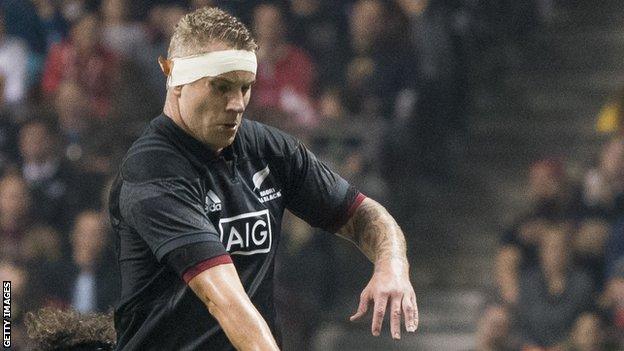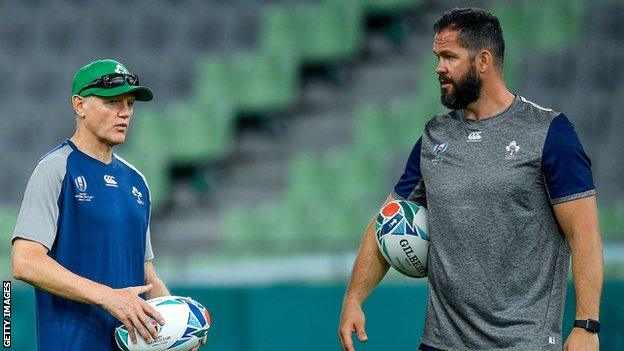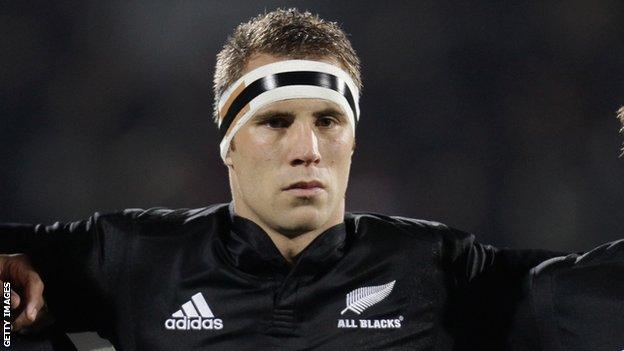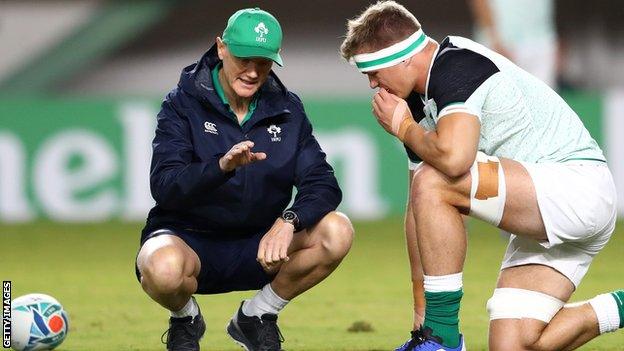Rugby World Cup: 'Revolutionary' schools coach Schmidt was 'on a totally different level'
- Published

Jarrad Hoeata in action for the Maori All Blacks against Canada in November 2017
Rugby World Cup quarter-final: Ireland v New Zealand |
|---|
Venue: Tokyo Stadium Date: Saturday, 19 October Kick-off: 11:15 BST |
Coverage: Live commentary on BBC Radio 5 Live, BBC Radio Ulster and online with text updates on the BBC Sport website and app. |
"The school coaches in New Zealand rugby are actually pretty good - I've travelled and seen other systems around the world and they're top class, but Joe was another level above that."
Jarrad Hoeata was a 17-year-old entering his final year at Tauranga Boys' College in New Zealand's Bay of Plenty region when Joe Schmidt arrived at the school.
Hoeata remembers Schmidt the teacher as a strict and authoritative presence, keen to build a reputation quickly and demand respect having arrived from a nearby rival school.
Then there was the rugby. The new deputy principal would also take charge of the school's first XV.
New Zealand's schools rugby system is, unsurprisingly, the standard bearer around the world - providing a seemingly endless conveyor belt of future All Blacks primed and ready to carry the mantle that comes with being the most feared nation in the sport.
Tauranga Boys' College was not a name that sat among the most prestigious rugby schools in the county.
"It's a big school and they do well in a lot of sports," explains Hoeata.
"But they don't really specialise in rugby like some of the big schools do."

Joe Schmidt will be succeeded as Ireland head coach by Andy Farrell
Hoeata was among the school's promising rugby talents, but at that stage he was not knocking on the door of national recognition.
Yet 10 years after leaving the school he became an All Black, having been guided by several internationally renowned coaches, including current Japan boss Jamie Joseph.
But it was in Tauranga, under Schmidt, that Hoeata took his first steps towards turning a hobby into a career.
"For me, it was the first time that I had a taste of true professionalism," he explains.
"It was just a totally different level from the coaches that had been there before.
"There were things like attention to detail, planning phases in advance. There were a lot of things that the boys hadn't come across before where you had four phases in advance, and you knew as a player exactly where you were going and which ruck you were hitting.
"At that point in time, he was a bit of revolutionary."
'A frontrunner in that space'
In six years as Ireland head coach, Schmidt's meticulous approach has become his hallmark.
Chris Farrell and Will Addison tell stories of receiving texts and detailed analysis from Schmidt of moments in their club rugby games outside of Ireland. It shows the lengths the Kiwi has gone to cover every base.
One expects that his methods and ideas have evolved over the past two decades. However Schmidt's forensic attention to detail has remained the cornerstone of his coaching from way back in Tauranga.
"I had never seen of it or heard of it, especially at school rugby," Hoeata says.

Hoeata was capped three times by the All Blacks in 2011
"He was the first one to bring in a bit of analysis. At the time, we actually did no analysis on the other teams. There might have been a little bit of chat around one of their superstar players but at schoolboy level there was no detailed analysis.
"He brought in a whole different level of picking apart their strengths and weaknesses, which was another big thing for me.
"A lot of teams do that now, but he was a real frontrunner in that space.
"It was a big learning curve and something I hadn't seen until Joe came along, and I think that's what he's brought to his teams [since leaving New Zealand] too."
They don't know about Joe
Schmidt's passion for analysis was a hit, and three years after arriving at Tauranga, he left to turn his attentions to full-time coaching with Bay of Plenty.
In 2007, he moved to Europe with Clermont Auvergne, spending three years as a backs coach before taking the opportunity to come to Ireland as head coach of Leinster.
Schmidt has been Ireland coach since 2013, and will step down at the end of this Rugby World Cup adventure.
Talk of his legacy will have to wait until the tournament's conclusion, as the biggest and most important chapter is still to be written.
However, he can be quite confident of being remembered fondly by Irish rugby fans having delivered three Six Nations titles, a Grand Slam and a number of historic results against southern hemisphere opposition.

Schmidt's coaching style is marked by attention to detail
He is likely to be remembered as Ireland's most influential coach in the professional era - yet such a reputation does not translate to his rugby-mad homeland.
"To be fair, a lot of people in New Zealand probably wouldn't know Joe as much as you'd think," says Hoeata.
"When you talk about Joe Schmidt in rugby circles, everyone thinks of a very educated rugby brain.
"They compare him to someone like [former All Blacks coach] Wayne Smith, who has a huge reputation in New Zealand.
"Because he left quite early, outside of tight rugby circles probably quite of lot of people don't know a lot about Joe."
Schmidt has already enjoyed unprecedented success against New Zealand, with Ireland winning two of the three meetings since 2016.
However there is no doubt that he, and the rest of his charges, would sacrifice both of those previous wins for a victory in Tokyo on Saturday.
A chance to reach the World Cup semi-finals for the first time beckons.
And for Schmidt, a chance to cement his reputation in Ireland and ensure his name becomes known far and wide in New Zealand.